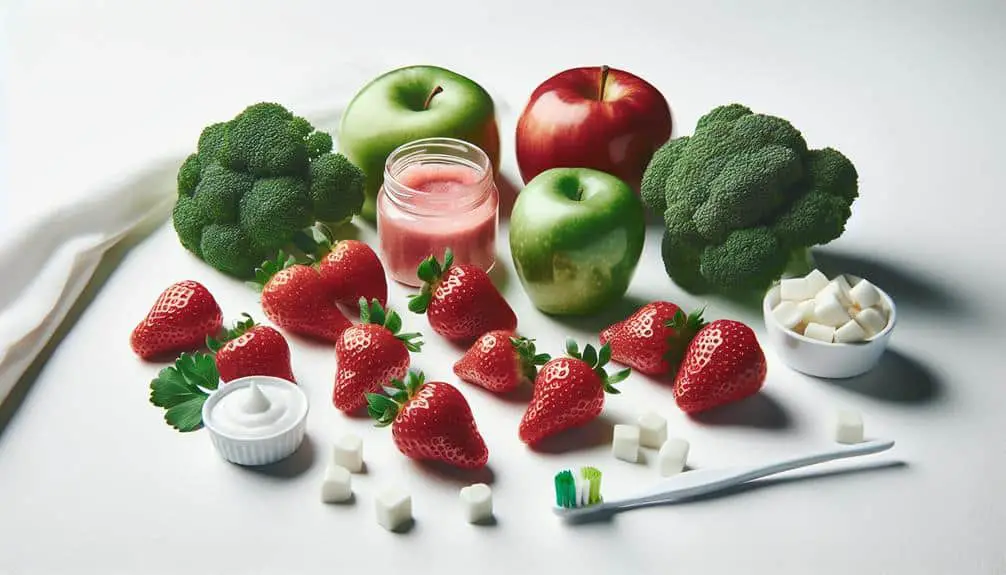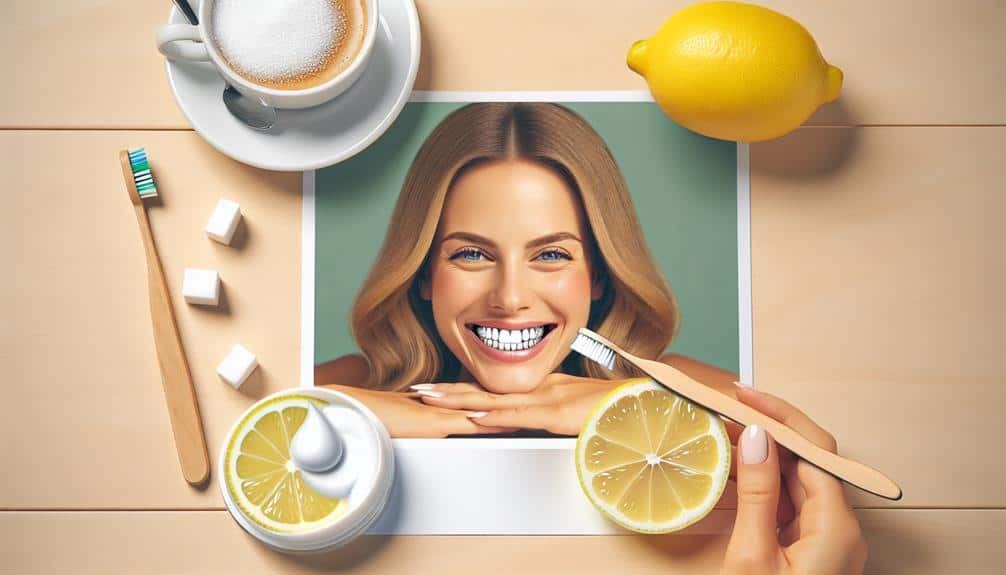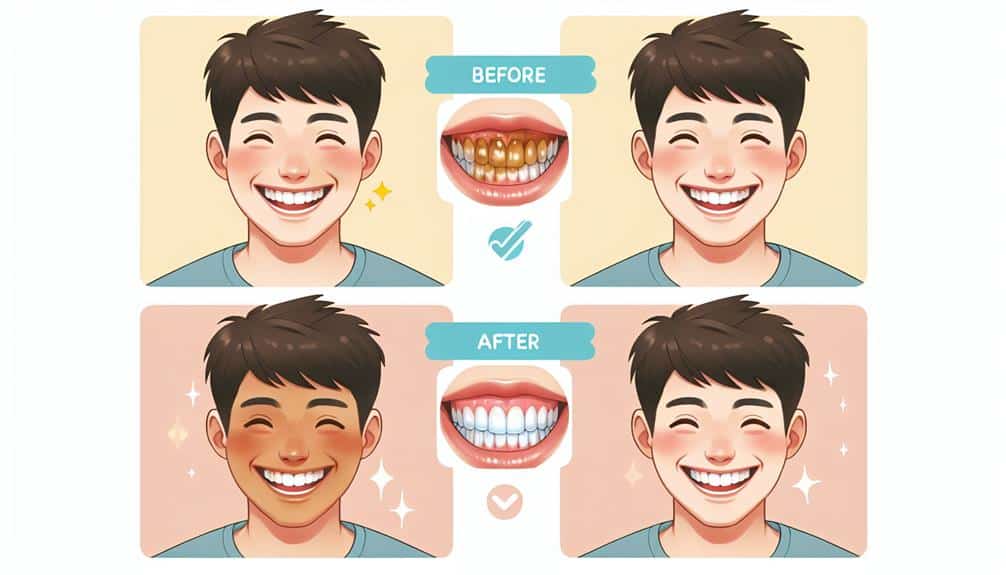Brighten your coffee-stained teeth with ease. Enjoy vitamin C-rich foods like citrus fruits and strawberries. These antioxidants help remove stains by increasing saliva and breaking down plaque. Munch on crunchy fruits and veggies too. They act as natural cleaners, supporting enamel strength and oral health. Incorporate dairy for calcium; milk, yogurt, and cheese help rebuild enamel and shield teeth. Sip on green tea to combat bacteria and lessen inflammation for fresher breath and potential oral cancer risk reduction. Don't forget nuts and seeds – they're packed with nutrients that promote saliva production and maintain a healthy mouth. Opt for these foods for a brighter smile.
Key Points
- Citrus fruits like oranges and lemons contain vitamin C to break down stains.
- Crunchy fruits and vegetables act as natural toothbrushes, aiding in stain removal.
- Dairy products like milk and cheese help remineralize enamel for a whiter smile.
- Green tea combats bacteria, reduces inflammation, and freshens breath for oral health.
- Nuts and seeds promote saliva production and support the oral microbiome, aiding in whitening.
Foods Rich in Vitamin C
To effectively whiten coffee-stained teeth, incorporating foods rich in Vitamin C into your diet can play a beneficial role in brightening your smile. Citrus fruits like oranges, lemons, and grapefruits, along with strawberries, are excellent sources of Vitamin C. These fruits not only provide essential nutrients but also offer natural whitening properties for your teeth.
Vitamin C is an antioxidant that helps prevent the buildup of plaque on your teeth, which can lead to discoloration. By including citrus fruits and strawberries in your diet, you can benefit from their whitening effects while also enjoying the antioxidant benefits they provide.
Citrus fruits and strawberries stimulate saliva production, which naturally helps cleanse your mouth and remove food particles that can contribute to staining. Additionally, the acidity in these fruits can help break down plaque and surface stains, revealing a brighter smile over time. Incorporating Vitamin C-rich foods into your daily meals can complement your oral hygiene routine and support your efforts to whiten coffee-stained teeth.
Crunchy Fruits and Vegetables
Incorporating crunchy fruits and vegetables into your diet can help naturally clean and brighten coffee-stained teeth. These foods act as natural toothbrushes, stimulating saliva production which helps in washing away food particles and bacteria that can lead to plaque buildup. Additionally, the texture of crunchy fruits and vegetables like apples, carrots, and celery can gently scrub the surface of your teeth, aiding in the removal of stains caused by coffee consumption.
Maintaining good oral hygiene is important for preserving the health of your teeth and gums. Crunchy fruits and vegetables not only assist in cleaning your teeth but also promote overall oral health. They're rich in nutrients that support strong tooth enamel, the protective outer layer of your teeth. By including these foods in your diet, you can help strengthen your teeth and reduce the risk of enamel erosion, which is essential for a bright and healthy smile.
Dairy Products for Calcium
Enhance your calcium intake by including dairy products in your diet to support excellent oral health and strengthen your teeth. Dairy products are rich in calcium, a mineral essential for maintaining strong teeth and bones. Milk is a great source of calcium and also contains phosphorus, which helps remineralize tooth enamel. Additionally, milk contains casein, a type of protein that forms a protective layer on the enamel, reducing the risk of cavities.
Yogurt is another excellent dairy option that offers not only calcium benefits but also probiotics that promote good oral health. Probiotics help reduce harmful bacteria in the mouth, which can lead to tooth decay and gum disease.
Cheese is also beneficial for oral health as it contains calcium and casein, which can help neutralize acids in the mouth that can erode enamel.
When it comes to cream, it's crucial to mention that while it may not be as high in calcium as other dairy products, it can still contribute to your overall calcium intake. Just be mindful of consuming high-fat creams in moderation to support both your oral health and overall well-being.
Green Tea and Its Benefits
Green tea offers a range of oral health benefits due to its antioxidant properties and ability to combat bacteria in the mouth.
Green tea benefits oral hygiene by reducing inflammation and limiting the growth of harmful bacteria that can lead to cavities and gum disease. The catechins present in green tea have been shown to inhibit the growth of Streptococcus mutans, a type of bacteria that contributes to plaque formation. Additionally, green tea can help freshen breath by neutralizing odors in the mouth.
Research suggests that regularly consuming green tea may also lower the risk of developing oral cancer due to its high levels of polyphenols. These compounds have been shown to have anti-cancer properties, potentially protecting cells from damage that can lead to cancer development.
To maximize the oral health benefits of green tea, it's recommended to drink it without added sugar and to swish it around the mouth before swallowing to allow the antioxidants to come into contact with teeth and gums.
Nuts and Seeds for Oral Health
Nuts and seeds play a significant role in maintaining excellent oral health due to their nutrient-rich composition and beneficial effects on teeth and gums. These tooth-friendly snacks offer a variety of benefits that contribute to a healthier mouth. Here are some reasons why incorporating nuts and seeds into your diet can enhance your oral health:
- Rich in Essential Nutrients: Nuts and seeds are packed with essential nutrients like calcium, magnesium, and vitamin E, which are essential for maintaining strong teeth and healthy gums.
- Promotes Saliva Production: Chewing nuts and seeds stimulates saliva production, which helps neutralize acids in the mouth and prevent tooth decay.
- Natural Abrasiveness: The crunchy texture of nuts and seeds can act as a natural abrasive, helping to remove plaque and stains from the surface of your teeth.
- Supports Oral Microbiome: Certain nuts and seeds contain beneficial fats that support a healthy oral microbiome, promoting overall oral health.
In addition to regular brushing and flossing, incorporating nuts and seeds into your diet can be a tasty way to boost your oral health.
Frequently Asked Questions
Can Whitening Foods Completely Remove Coffee Stains From Teeth?
To completely remove coffee stains from teeth, whitening foods alone may not be sufficient. While natural remedies like foods can help, the effectiveness may vary. Incorporate daily habits for maintenance to maximize results and consider professional dental treatments for best whitening.
Are There Any Potential Side Effects of Consuming Too Many Whitening Foods?
Indulging in an excess of whitening foods might not grant you a radiant smile. Potential risks lurk in overconsumption, impacting dietary balance and oral health. Remember, moderation is key to avoiding unintended consequences.
How Long Does It Typically Take for Whitening Foods to Show Noticeable Results on Teeth?
For noticeable whitening results on teeth, regularly use whitening toothpaste and incorporate DIY and natural remedies. Brushing techniques play an important role. Results vary, but with consistent efforts, improvements can be seen in a few weeks.
Are There Any Specific Foods to Avoid While Trying to Whiten Coffee-Stained Teeth?
When aiming to whiten coffee-stained teeth, be mindful of diet restrictions. Some foods and beverages, like acidic fruits, sugary snacks, and dark liquids can hinder progress. Also, consider tooth sensitivity when choosing whitening methods.
Can Whitening Foods Replace Professional Teeth Whitening Treatments From a Dentist?
DIY whitening with natural remedies can be cost-efficient but may not fully replace professional treatments. While some foods can help, their effectiveness varies. For best results, consult a dentist for tailored whitening options.



